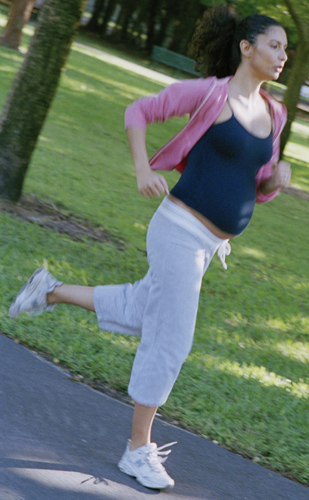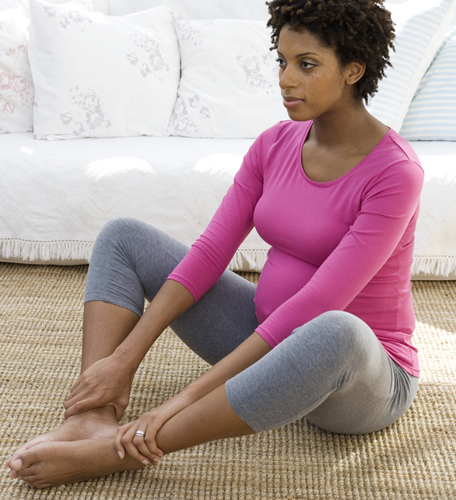Exercise in late pregnancy Adapting your routine to suit your changing needs
Toward the end of
pregnancy, you will inevitably slow down, but you may not want to stop
altogether! Here are some sensible ways to modify your exercise.
In later pregnancy, avoid exercises that involve sudden movement, such as tennis, as your balance is less steady now.
Swimming is perfect in late pregnancy and aids relaxation.
Reduce the intensity and length of your workout to avoid exhaustion.
Exercise in 10-minute increments 3 times a day, rather than one 30-minute session.
Prenatal yoga
Practicing yoga in
pregnancy is hugely beneficial. As well as strengthening and toning
muscles, which will help you in labor and birth, yoga aims to bring
about a greater awareness of your breathing rhythms, providing a perfect
relaxation tool in pregnancy and preparing you to breathe through the
contractions. Find an accredited teacher experienced in teaching
pregnant women or attend an prenatal class.
Standing poses in yoga focus on achieving core stability and a
firm foundation. This is beneficial during pregnancy when the additional
weight you are carrying can affect your balance and cause unsteadiness.

Calming sitting poses that concentrate on aligning your spine
help you to focus on steadying your breathing and to center yourself.
Using a wall for guidance helps you to feel supported and brings your
attention inward to your breath.

NOTE
Gentle, strengthening exercise, such as a brisk walk each day, can provide you with more stamina for labor and birth
Safe exercise Taking care in pregnancy
Although
exercise is highly recommended during pregnancy, this is a time when you
may have to moderate your usual program, especially as you get bigger,
and avoid types of exercise or situations that may put you or your baby
at risk.
| Q: |
What safety precautions should I take?
|
| A: |
If you are taking up a new exercise during pregnancy, be
sensible about which type of exercise you choose. Avoid any type that is
too strenuous and opt for low-impact activities, such as walking and
swimming. Always do warm-up stretches before exercising, stay
well-hydrated, and build up your fitness gradually. This is especially
important since hormones in pregnancy relax joints and ligaments in
preparation for labor (see exercise regime),
which makes you more susceptible to injury. Avoid exercising in very
hot conditions since this may be harmful to the baby; in hot months,
exercise early in the morning or indoors. Also, avoid exercising near
traffic since you are more likely to be affected by pollution while
exercising. Your center of gravity changes in pregnancy, so avoid
high-impact, fast-moving sports, such as tennis.
|
| Q: |
Should I stop exercising at any time?
|
| A: |
You should stop exercising right away if you feel dizzy or short
of breath; if you are overheating; have pain in your back, pelvis, or
chest; headache, calf pain or swelling; vaginal leaking; or if you feel
exhausted.
|
If you are used to jogging, it is safe to continue with this in
pregnancy unless you have had problems in this pregnancy or previous
ones.

Swimming is the ideal exercise during pregnancy, providing a
moderate aerobic workout, toning muscles, and helping you feel
weightless.

Yoga and relaxation classes are beneficial in pregnancy, helping
you to focus on your breathing and increasing your suppleness.
